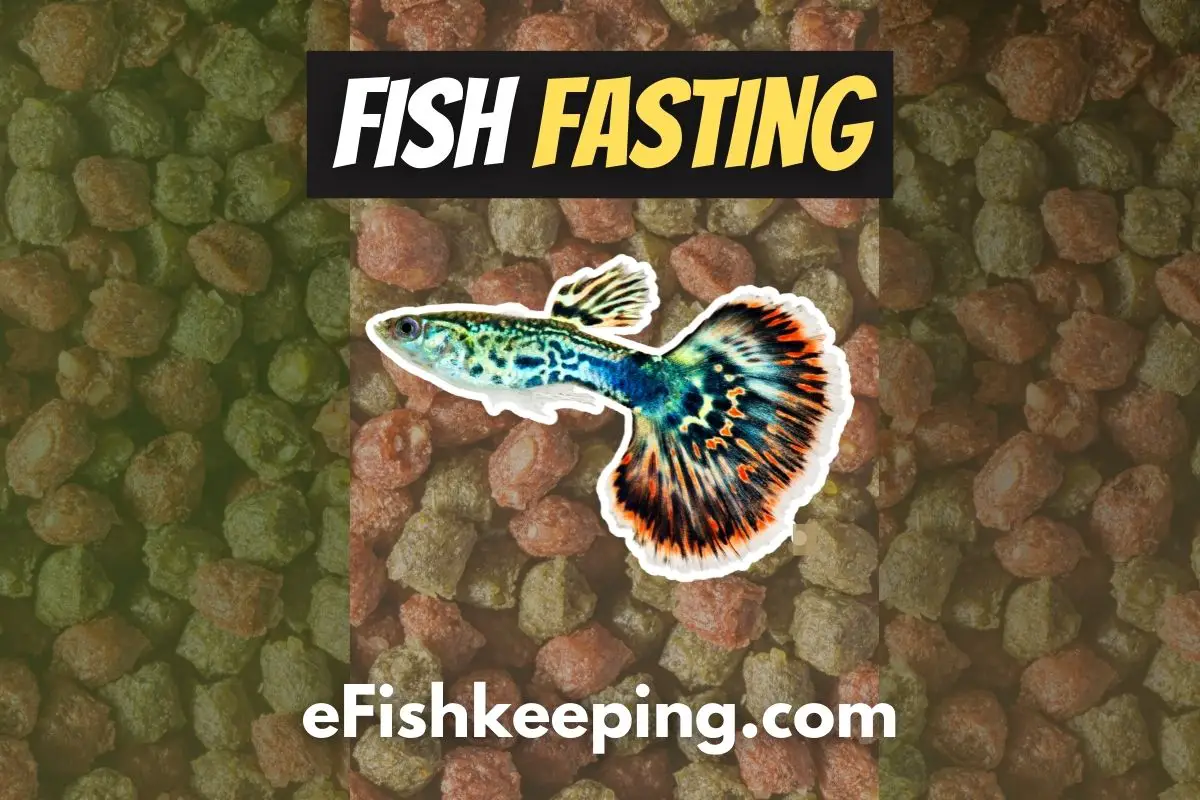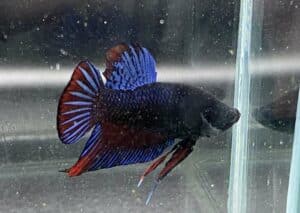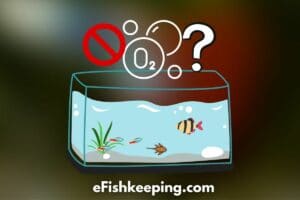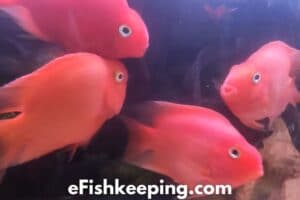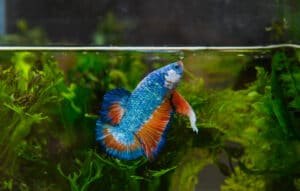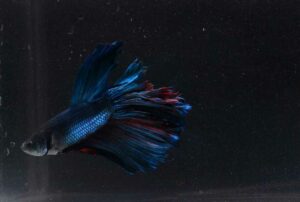Professionals and hobbyists alike rave about the benefits of fish fasting; i.e., not feeding their fish once or twice a week. But what is fish fasting, exactly, and should you do it?
In this fish fasting: everything you need to know guide, I’ll discuss the advantages of fish feeding, as well as the dangers associated with underfeeding fish. Let’s dive right in!
What Does Fasting a Fish Mean?
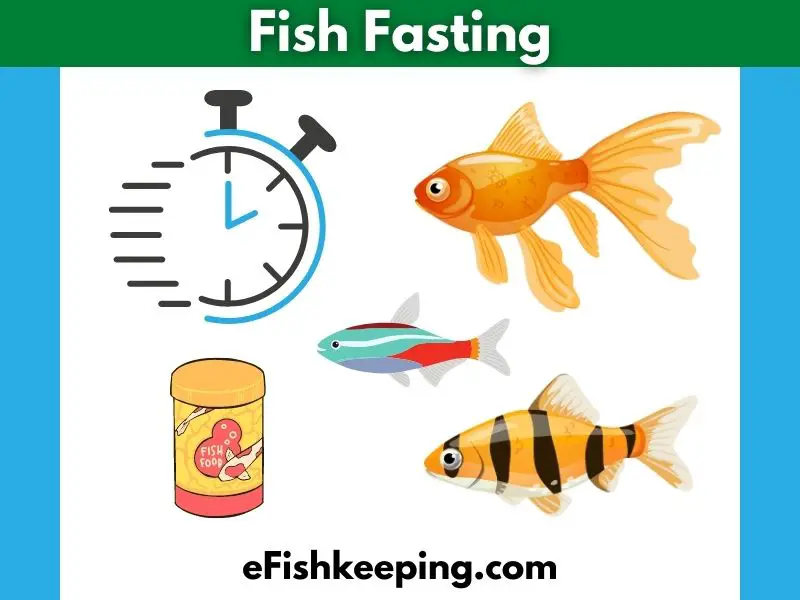
Fish fasting is a feeding technique in which fish are purposely not given food once or twice a week to clear and improve the function of their digestive systems.
In the wild, fish don’t always eat every day. If they’re lucky enough to score a plentiful food source, they eat multiple times a day. If food sources are scarce, however, they might go for days between meals.
As a result, fish are opportunistic by nature. Given that they’re mostly omnivores, they aren’t too picky about what they eat.
So when you stop feeding fish once or twice a week, you’re essentially emulating their natural habitat. Doing so also prevents overfeeding, bloating, and a whole host of digestive problems.
Is It Good To Let Fish Fast?
Fasting fish comes with an array of physical benefits. Here are some of the biggest reasons why you should start fasting your fish if you haven’t already:
#1. Enhances Cold Resistance
When winter comes, mammals increase their food intake to build up fat reserves. Fish, on the other hand, minimize or stop feeding entirely.
According to a study published by the Journal of Physiology, fish that are purposely fasted for 24 to 48 hours a week have enhanced resistance to the cold, as opposed to fish that are regularly fed twice a day.
This suggests that fasting might be a protective strategy for fish to live longer under cold stress.
Unless you have a temperature regulator, you can’t always control the temperature of your aquarium—especially during the colder months.
In summer, you can easily lower the water temperature by placing a floating bag of ice in the fish tank for several minutes. But in winter, it’s not so straightforward.
Fasting fish once or twice every week helps them become more resistant to the cold, which in turn reduces the risk of death during the winter months.
#2. Reduces the Risk of Constipation and Bloating
Fish that regularly feed on a flake- or pellet-based diet are prone to constipation, which is usually associated with bloating and stringy feces. If left untreated, constipation can lead to health issues such as physical blockages, Hexamita infections, and swim bladder.
Although commercial fish food has its benefits, it’s not what fish are evolved to eat. Fasting helps fish remove all that food from their system, reducing the risk of food-related issues such as constipation.
Furthermore, fasting fish once or twice a week gives their bowel a much-needed rest from man-made fish food, which is often made from flour and other binding or bulking agents.
#3. Improves Digestive Flexibility
According to research, short-term fasting improves a fish’s digestive flexibility, which is one of the biggest factors of long-term survival.
It allows them to maximize energy and nutrient return from their daily diet, as well as reduce their overall energy and protein requirements.
#4. Prevents Overfeeding
Overfeeding is arguably the biggest cause of fish mortality, and the most common mistake new owners make.
As mentioned earlier, fish are opportunistic feeders. They’d eat anything their small mouths can get on, even if they’re full.
Unfortunately, this results in improper digestion, fatty liver, flatworm, and other health problems.
Remnants of fish food can also clog your filter and break down into harmful toxins, such as high ammonia and nitrate, leading to bacterial infections and fin rot.
Fasting fish prevents such things from happening. If you accidentally overfeed your fish, letting them fast for 24 to 48 hours is a good way to “soothe” their stomachs when they’d eaten too much the day prior.
#5. Improves Water Quality
This advantage is good for both the fish and the fish keeper. It helps maintain the tank’s water quality since food won’t float around or rot at the bottom, so you don’t have to change the water in the tank as often as you normally do.
That said, never underfeed your fish for the sake of water quality. The improvement of water quality is merely a side benefit, and should never be used as an excuse to not change the water of the tank.
How Long Can I Fast My Fish?
The number of days your fish should fast depends on how large and active your fish are.
Smaller fish—like Tetras and Rasboras—are often more active than larger fish, meaning they need more food than the latter. After all, they need to replenish the energy they spent swimming and playing around. So if your fish are small and active, they should fast for only a day.
Large fish, particularly large adult fish, can go longer between meals. The same is said for fish with slower metabolisms like Goldfish. Thus, they can fast for longer; up to three days.
Some people fast their adult fish for longer, but I don’t recommend doing so unless they live in a pond with tons of microorganisms to munch on.
Read: How Long Can Guppies Go Without Food?
Is It Good To Not Feed Fish For A Day?
Whether you’ve forgotten to feed your fish or ran out of fish food, not feeding your fish for a day won’t cause any harm. It might actually do your fish some good.
As discussed earlier, fasting fish for a day or two a week reduces the risk of bloating, constipation, and fish obesity. It also improves a fish’s immune system by enhancing cold resistance and digestive flexibility.
With that said, it’s stressful for fish to have their feedings interrupted. This is especially true if they’re used to multiple feeding a day.
So if you want your fish to fast, gradually introduce the idea by offering a single light feeding every so often and increasing the time in between feeding.
Once they’re used to it, you can start fasting your fish for one to two days, depending on their metabolism and size.
Can Fish Go 3 Days Without Food?
Healthy, adult fish can go up to three days without food with little to no repercussions. Normally, adult fish have a good amount of fat reserves and body mass to skip three meals once in a while.
Can I Go 4 Days Without Feeding My Fish?
Yes, but do so with caution. Aquarium fish shouldn’t purposely go without food for more than three days.
Observe your fish’s behavior and see how they react after three days of no food. If they act as they normally do, it’s safe to assume that they can go another day without food.
Can I Go 5 Days Without Feeding My Fish?
Depending on their metabolism, size, and water temperature, adult fish can survive five days to up to a week without any food. Some species can even live for more than two weeks without eating.
Here’s an approximation of how long fish can safely live with little to no food, depending on the species:
- Betta: 1 to 2 weeks
- Goldfish: 10 days
- Tetras: 10 days
- Angelfish: 1 week
- Guppies: 7 to 10 days
- Plecos: 10 to 14 days
- Loaches: 10 days
- Cory catfish: 2 weeks
That said, fish shouldn’t go more than a day or two without food. Fish need a set amount of nutrients to survive. If you’re not careful, you may be leading your fish to an early grave if you fast them for longer than required.
Should I Fast My Fish Once A Week?
It’s highly recommended to fast your fish at least once a week.
Remember: in nature, fish don’t eat food regularly. If food sources are scarce, they can go up to two whole weeks without food. So, it’ll definitely do your fish some good to fast once every week.
If you still feel a bit guilty for purposely withholding food, keep in mind that fish won’t truly be fasting since they can still nibble on algae and microorganisms found in the water.
This means that fasting enables (or, well, forces) them to get some diet that’s not included in the commercial fish food.
When Should I Let My Fish Fast?
Let your fish fast when they’re adults and able to reproduce. It’s at this stage that they’ve reached full maturity and have better resistance to the lack of food.
As for what day of the week you should fast your fish. you don’t necessarily need to stick to a certain schedule.
Fish don’t have a sense of time like some mammals do, so it’s okay for them to fast on completely random days. Still, setting a schedule makes feeding time easier to follow. It does for me, at least!
How Do You Know When Your Fish Is Hungry?
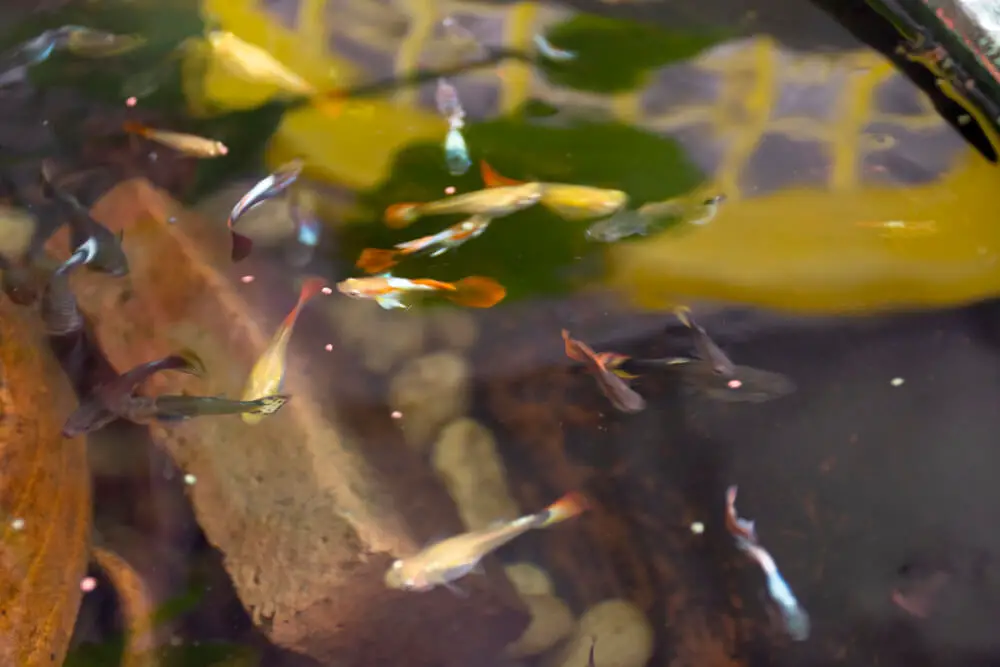
Underfeeding is just as dangerous—and sometimes even more so—than overfeeding.
Underfeeding fish may lead to impaired growth, eye problems, anemia, weakened gills, dropsy, and other serious health issues, such as over-pigmentation, deformed cartilage, and kidney and liver hemorrhage.
While it’s certainly more preferable for your fish to be slightly underfed than overfed, it’s all too easy to fatally underfeed fish. Balance is key, here!
Here are some telling signs that your fish is hungry:
- Digging around the substrate
- Sunken bellies
- Paler-than-normal color
- Aggressive behavior
- Slow or sluggish behavior
- Swimming at the top of the aquarium, waiting for food
Note that some of these signs are similar to symptoms of internal parasites of worms. If your fish are eating normally but still don’t seem to gain weight, they might need some deworming or antiparasitic medication to get rid of unwanted parasites.
How Often Do I Need To Feed My Fish Normally?
Generally, fish need to eat anywhere between one to three times a day.
When feeding your fish, always follow the five-minute rule: If your fish finish the food you offered in under five minutes, you’re giving them just the right amount of food. If it’s taking more than five minutes, you’re giving them too much food, too soon.
Adjust the quantity of the food according to the size and number of fish in the tank. In general, most fish do well with just one or two feedings per day, but some fish—particularly small, growing fish with small bellies—need to be given small feedings of up to three times a day.
Keep in mind that fish eat the food they’re offered even when they’re not starving. So, don’t feel bad if your fish “beg” for food every time you’re near the tank even if they’ve already eaten a few hours prior.
Timing is not as critical as food portions, but do try to keep the feedings consistent. Also, make sure your feedings match their biological clock. If your fish are nocturnal, for instance, be sure to feed them just before lights out.
Final Thoughts
Fish fasting comes with a ton of benefits. It enhances cold resistance, reduces the risk of constipation, prevents overfeeding, and improves digestive flexibility.
Additionally, it improves the quality of the water, so you don’t have to change the water as often as you normally would when you feed your fish every day!
Hi! I’m Praveen Ghoshal, the founder of eFishkeeping.com. Inspired by my Dad, I got interested in fishkeeping when I was a kid. Since then, I have been involved with this hobby. Currently, I have 3 fish tanks at our home, and I enjoy this hobby with my full family. Read more about me here.

